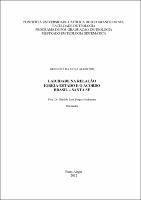| Share record |


|
Please use this identifier to cite or link to this item:
https://tede2.pucrs.br/tede2/handle/tede/5860| Document type: | Dissertação |
| Title: | Laicidade na relação igreja-estado e o acordo Brasil - Santa Sé |
| Author: | Alberton, Genacéia da Silva  |
| Advisor: | Hackmann, Geraldo Luiz Borges |
| Abstract (native): | Na relação Igreja-Estado, a laicidade é o elemento tensor a manter a autonomia entre o religioso e o público. Embora não se confunda com o laicismo, a laicidade é um dos aspectos da secularização, tomando ares de anticlericalismo no laicismo. O Concílio Vaticano II, através dos documentos conciliares Lumen Gentium e Gaudium et Spes, deu uma resposta aos sinais dos tempos. Reafirmando a primazia da Igreja, reconheceu a liberdade religiosa como direito integrante da dignidade humana, devendo ser preservado. A Igreja, entendida como comunhão e participação, veio dar ao leigo um espaço de atuação que supera a responsabilidade apenas como cooperador em atos litúrgicos, mas como efetivo protagonista no século. Em decorrência, suscita-se a atuação do cristão no espaço público do Estado como exercício de direito frente ao pluralismo religioso e à liberdade religiosa como direito fundamental. A razão pública será a base de argumentação que tem na dignidade humana e proteção de direitos fundamentais os eixos que permitem a cooperação entre Estado e Igreja na busca do bem comum, respeitadas as respectivas autonomias naquilo que lhes é próprio. O Acordo Brasil-Santa Sé é documento que dá vigor à relação harmônica da Igreja Católica com o Estado brasileiro num país laico em que a democracia fortalecida pela Constituição de 1988 faz surgir questões a respeito do religioso no espaço do público. O Acordo, no âmbito da política de atuação da Igreja, solidifica posições firmadas jurisprudencialmente, possibilitando a garantia de livre atuação da Igreja na missão, suscitando, frente às demandas judiciais, o uso da razão público para garantia do direito fundamental à liberdade religiosa. As tensões decorrentes da laicidade exigem da Igreja desenvolver a escuta e o diálogo e do Estado brasileiro, o reconhecimento da importância cultural e religiosa da Igreja Católica, superando os conflitos em outros espaços que não apenas o Judicial, fortalecendo a sã laicidade e a cooperação para o bem comum. |
| Abstract (english): | In the relationship between Church and State, laicity is the tensioning element that maintains the autonomy between religious and public life. While it should not be confused with laicism, laicity is one of the characteristic aspects of secularization with laicism taking on an air of anti-clericalism. Through the conciliar documents Lumen Gentium and Gaudium et Spes, the Second Vatican Council responded to the signs of the times. While reaffirming the primacy of the Church, the Council recognized religious freedom as a right that is integral to human dignity and that must be preserved. The Church as communion and participation has given the laity greater scope for action which surpasses their responsibility as mere cooperating agents in liturgical acts and makes them effective protagonists in the century. As a result, Christian action in the public space of the State arises as an exercise of rights in the face of religious pluralism, and religious freedom becomes a fundamental right. Public reason shall be the basis of the argument that human dignity and protection of fundamental rights are the axes permitting cooperation between Church and State in the search for the common good, with respect for the autonomy of each institution in its own sphere. The Agreement between Brazil and the Holy See is the document that gives vigor to the harmonious relationship between the Catholic Church and the Brazilian State in a lay country in which the democracy strengthened by the Constitution of 1988 gives rise to questions regarding religion in the public space. The Agreement, in the framework of the Church's policy of action, solidifies the positions secured by jurisprudence, makes it possible to guarantee the Church's free action in its mission, and gives rise to the use of public reason to guarantee fundamental rights and religious freedom in the face of legal demands. The tensions resulting from laicism require the Church to develop its ability to listen and dialogue. They also require the Brazilian State to recognize the cultural and religious importance of the Catholic Church, overcoming conflicts in spaces other than the judiciary, and strengthening a healthy laicity and cooperation for the common good |
| Keywords: | RELIGIÃO IGREJA E ESTADO - BRASIL LAICISMO LEIGOS - IGREJA CATÓLICA |
| CNPQ Knowledge Areas: | CNPQ::CIENCIAS HUMANAS::TEOLOGIA |
| Language: | por |
| Country: | BR |
| Publisher: | Pontifícia Universidade Católica do Rio Grande do Sul |
| Institution Acronym: | PUCRS |
| Department: | Faculdade de Teologia |
| Program: | Programa de Pós-Graduação em Teologia |
| Citation: | ALBERTON, Genacéia da Silva. Laicidade na relação igreja-estado e o acordo Brasil Santa Sé. 2012. 13 f. Dissertação (Mestrado em Teologia) - Pontifícia Universidade Católica do Rio Grande do Sul, Porto Alegre, 2012. |
| Access type: | Acesso Aberto |
| URI: | http://tede2.pucrs.br/tede2/handle/tede/5860 |
| Issue Date: | 31-Jul-2012 |
| Appears in Collections: | Programa de Pós-Graduação em Teologia |
Files in This Item:
| File | Description | Size | Format | |
|---|---|---|---|---|
| 441459.pdf | Texto Parcial | 224.62 kB | Adobe PDF |  Download/Open Preview |
Items in DSpace are protected by copyright, with all rights reserved, unless otherwise indicated.




